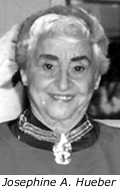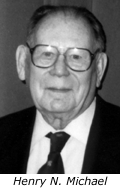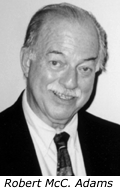 |
|
Honors & Other Things
Two Guggenheim Fellows
Two members of the standing faculty have won John Simon Guggenheim Foundation
Fellowships in the 2000 round, which gave out awards to 182 scholars and
creative artists across the nation. The Penn winners and the studies they
expect to complete as Guggenheim Fellows are: Hai-Lung Dai, professor
of chemistry: Chemical-Reaction Control and
Robert Blair St. George, associate professor of history: Spoken
Language and Oral Poetics in Early New England. |
 |
 |
NSF Award: Dr. Ubel
Dr. Peter Ubel, assistant professor of general internal medicine,
has received the Presidential Early Career Award for Scientists and Engineers
from the National Science Foundation. This Award is given to outstanding
scientists and engineers beginning their independent careers. Dr. Ubel,
a general internist and bioethicist at UPHS, is also affiliated with the
VA Medical Center in Philadelphia.
Dr. Ubel's research explores how to determine the values of both patients
and the general public, which can then be used for setting healthcare priorities
by physicians, government healthcare agencies, medical insurance companies,
and other industry stakeholders. His research is discussed in his book Pricing
Life: Why It's time for Healthcare Rationing, published recently by
MIT Press.
The selection by the NSF is from among the most highly regarded first-year
investigators and is funded through its Faculty Early Career Development
Program. Dr. Ubel will receive approximately $125,000 over a five-year period. |
Krogman Award: Dr. Howell
Dr. F. Clark Howell, a physical anthropologist world-renowned
for his ground-breaking cross-disciplinary efforts to broaden the focus
of paleo-anthropology, the study of human origins, received the first Wilton
Krogman Award for Distinguished Achievement in Biological Anthropology.
Dr. Jeremy A. Sabloff, the Williams Director of the Museum of Archaeology
and Anthropology, presented Dr. Howell with the award on April 8, at a Museum
reception for the Society of American Archaeologists' Annual Meeting.
"Professor Howell's achievements over the past 50 years, including
major field projects and unparalleled scholarship in the study of human
origins from all over the Old World, make him truly worthy of being the
first recipient of this award," noted Dr. Sabloff. "There is little
doubt that his influence will be felt for many years to come."
The new award, developed to recognize scientists in the field of biological
anthropology, was created to honor the memory of Dr. Wilton M. Krogman,
former professor of physical anthropology at Penn (1947-1971), and founder,
in 1947, of the Philadelphia Center for Research in Child Growth (now the
W. M. Krogman Center for Research in Child Growth and Development). Dr.
Krogman was an internationally-recognized authority in child development
whose achievements ranged from paleoanthropological studies elucidating
human immigrations to Europe via western Asia, to developing the "Philadelphia
Growth Standards" used in evaluating the growth status of children
and youths.
A bronze plaque recognizing Krogman awardees will be placed outside the
Biological Anthropology Laboratory in the Department of Anthropology.
Angell Medal: Mrs. Hueber
Josephine A. Hueber, an active member of the University Museum's
Women's Committee since 1985, received the Angell Medal--named in honor
of Marian Angell Godfrey Boyer--established for distinguished service to
the Museum by a supporter. Mrs. Hueber's numerous leadership roles include
managing the Women's Committee tour program, forging the way with creative
membership development and fundraising efforts, and, most recently, organizing
the 44
Celebrity Eyes in a Museum Storeroom exhibit.
Mrs. Hueber, like her husband Edward K. Hueber (C'43), is a Penn
graduate (CW'47), and a long-time advocate of the University's cultural
institutions, such as the Annenberg Center, where she served as Chairman
of the Board of Advisors in the 1980s. |
 |
 |
Director's Award: Dr. Michael
Dr. Henry N. Michael, a long-time Senior Fellow in MASCA (Museum
Applied Science Center for Archaeology) world-renowned for his pioneering
work in the field of dendrochronology, received the University Museum's
Director's Award for exceptional volunteer achievement.
Associated with the University Museum for more than 61 years, Dr. Michael
is best known for his groundbreaking collaborative research with Dr. Elizabeth
Ralph on correction factors for radiocarbon dates. Dr. Michael is a leader
in the field of dendrochronology-the science of arranging events in the
order of time by the comparative study of the annual growth rings in ancient
timber.
Dr. Michael received his BA (1948), MA (1951) and Ph.D. (1954) from Penn,
going on to teach briefly here and then at Temple, from 1948 through 1980.
His latest venture, in collaboration with Alexander Dolitsky, director of
the Alaska-Siberia Research Center, is the translation and publication of
the legends and fairy tales of indigenous peoples on the Kamchatka peninsula
and along the Bering Straits. |
Drexel Medal: Dr. McC. Adams
Dr. Robert McC. Adams, former Secretary of the Smithsonian Institution
and an archaeologist renowned for his study of the origins of urbanism and
his pioneering settlement surveys of the southern Mesopotamian floodplain,
became the 27th recipient of the Museum's Lucy Wharton Drexel Medal for
archaeological achievement. Dr. Jeremy A. Sabloff, the Museum's Williams
Director, surprised him with the medal, the top honor that the Museum bestows
on a scholar. |
 |
 |
NAGS Award: Dr. Skilton-Sylvester
Dr. Paul Skilton-Sylvester, a lecturer and coordinator of the
masters program in elementary education at GSE, has been awarded the Northeastern
Association of Graduate Schools' 1999-2000 Doctoral Dissertation Award.
Each year NAGS recognizes an outstanding dissertation that has been produced
by a Ph.D. candidate at one of its member institutions. This year's recognizes
one in the social sciences and education. Dr. Skilton-Sylvester received
the award for his dissertation, Putting School/Work Back Together? A
Comparison for Organizational Change in an Inner City School and a Fortune
500 Company. In it, he wrote, "The questions posed by this dissertation
concern whether schools of lower income students are preparing them for
the new organization of work, or whether, through both the explicit and
implicit curricula, educators are continuing to prepare students for assembly
line jobs that no longer exist." It also asks whether the "new
'reengineered' jobs are less stultifying than the old ones, and whether
we, as educators, can conspicuously prepare our students to 'fit' in these
jobs, or whether we should prepare them to take a more critical stance." |
Almanac, Vol. 46, No. 30, April 25, 2000
| FRONT
PAGE | CONTENTS
| JOB-OPS
| CRIMESTATS
| COUNCIL:
Safety & Security Year-End Report | COUNCIL:
Facilities Year-End Report | COUNCIL:
Library Year-End Report | Commencement
2000 | TALK
ABOUT TEACHING ARCHIVE | BETWEEN
ISSUES | MAY at PENN |
|
|
|






